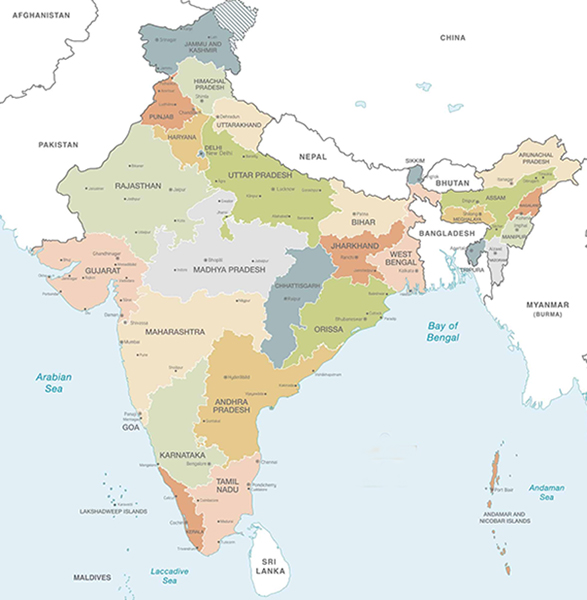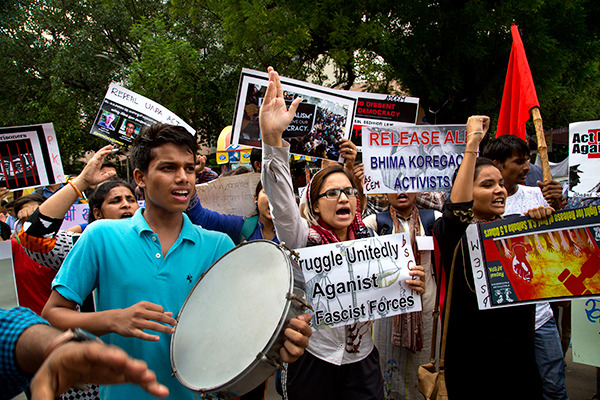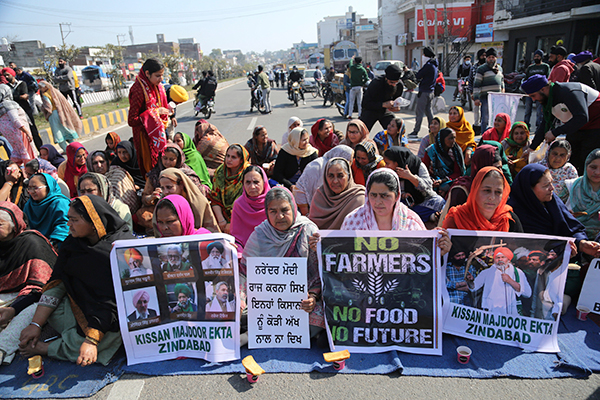From a Reader:
India’s Hindu-Fascist Regime Caught Red-Handed in Frame‑up of Progressive Activists—After Two Years of Brutal Imprisonment
| revcom.us
Editors’ note: India—the world’s second most populous country—has been in the tightening grip of a Hindu-fascist government since Narendra Modi became prime minister in 2014. Modi’s Bharatiya Janata Party (BJP) aims to impose the open domination of the Hindu majority over hundreds of millions of Indians of other religions, and to impose the most oppressive features of fundamentalist Hinduism on everybody. As part of that, Modi aims to gain unchecked political power and repress all resistance. The following is a contribution from a reader on this situation. (See previous revcom.us coverage for background: “What Happens When a Fascist Leader Is Re-Elected? A Flashing Red Warning Sign from India”; “Kashmir Dying”; and “Admit That the Waters Around You Have Grown”.)
India has had a longstanding Maoist movement waging armed struggle, now mainly led by the banned Communist Party of India (Maoist) (CPI[M]), referred to below. The repression of the Indian state against this movement and its supporters, especially by the Hindu-fascist government of Modi, has been vicious and has to be fiercely opposed. At the same time, there are crucial differences—in methods and goals—between Bob Avakian’s new communism and the CPI(M)’s adaptation and rendition of Maoism, and for more on this, readers can go to “Ajith—A Portrait of the Residue of the Past,” in issue #4 of Demarcations, a journal of communist theory and polemic.
A major focus of the tightening grip of fascism in India under the rule of Narendra Modi and the BJP has been the prosecution of 16 progressives who the government claims are members of the banned Communist Party of India (Maoist) (CPI[M]). The exact charges keep shifting, and have included trying to collect weapons and plotting to assassinate Modi himself. On this pretext, most of these activists have been denied bail and imprisoned for years under brutal conditions. It has now been exposed that the key “evidence” in this case was fabricated by the Indian authorities.
The imprisoned activists include Stan Swamy, 83, a Jesuit priest suffering from Parkinson’s disease; Varavara Rao, 80, a poet whose health deteriorated to the point that he became incoherent last summer (later he contracted COVID-19 and is now hospitalized); Sudha Bharadwa, 56, a lawyer who gave up her U.S. citizenship to work with oppressed tribal groups in India, and who suffers from diabetes and hypertension. Others are professors, writers, human rights activists and others not inclined to bow to a fascist regime.
Initially the arrests were tied to an “Elgar Parishad” (Congress for Speaking Aloud)—a conference on December 31, 2017 with speeches and cultural performances—organized by progressive forces to mark the 200th anniversary of a historic military victory won by Dalit1 soldiers at a village called Bhima Koregaon in the Maharashtra region in western India. That event brought together mainly Dalit people to celebrate the historic event and to stand against the oppression they face today. The next day, reactionary Hindu nationalists instigated violence during street celebrations by marching into the crowds waving the saffron (orange-yellow) flag of their movement. A 16-year-old boy was killed by police, and two local leaders of the ruling Hindu-fascist BJP were initially charged as instigators.
Targeting Progressives and Widening the Net
But local police soon turned their attention to those accused of organizing the Elgar Parishad, arresting five. This then mushroomed into a broad witch hunt against leftist intellectuals. By December 2019, almost two dozen artists and activists had been arrested (these new indictments included some, but not all, of the original defendants). First they were accused of having “enacted provocative songs, short plays, dance, and distributed books” so as to “create violence, instability and chaos.” In other words, the government claimed that by promoting the dignity and humanity of Dalits, they “provoked” Hindu nationalists to act violently!
Then police charged that the event was organized by a Maoist “front organization.” This was after two respected retired judges publicly stated that they alone had organized the event “with the simple motive of spreading the message of fighting communal forces.” (“Communal forces” is more or less the Indian equivalent of “hate groups.”) The case was taken over by the national police (the National Investigative Agency), which came up with a 17,000-page document that painted these activists as an urban arm of Maoist revolutionaries. By October 2020, the Bhima Koregaon case was being used to justify charges—and military operations—against a prominent Maoist leader.
These charges were widely seen as flimsy and outrageous, but police claimed they had “evidence”—10 letters to or from CPI(M) allegedly found on the laptop of Rona Wilson, one of the defendants. Police claimed that in one letter, “Wilson had written to a Maoist militant” and “discussed the need for guns and ammunition and urged the banned group to assassinate Modi.”
Police Hacked Computers to Plant Evidence
Now it has been exposed that police planted these letters. Human rights groups hired Arsenal Consulting, a high-profile Massachusetts digital forensics firm, to examine Wilson’s laptop. Arsenal reported that “An attacker used malware to infiltrate a laptop ... before [Wilson’s] arrest,” and created a “hidden folder to which at least 10 incriminating letters were delivered.” The malware also recorded Wilson’s keystrokes, passwords, and browsing activity.
Arsenal’s report stated that “This is one of the most serious cases involving evidence tampering that Arsenal has ever encountered.” And while the malware used against Wilson is commercially available, Arsenal also found that nine supporters of the defendants were hacked with “a [malware] tool sold only to governments.”
The Washington Post asked three independent experts in digital forensics to review Arsenal’s report, and they affirmed that the report’s “conclusions were valid.”
The Bhima Koregaon Defendants Must Be Freed!
Even before this outrageous frame-up was exposed, the arrests had been criticized or condemned by groups from the American Bar Association to the UN Human Rights office to Amnesty International India. But the Indian government is so far refusing to back down, claiming that it still has “substantial documentary and oral evidence.” (This “oral evidence” includes the testimony of an informant that at meetings of progressive attorneys, Wilson and another defendant would “insist on defending political prisoners”!)
This exposure comes in a time of mounting crisis for the Modi regime, with major farmers’ protests and growing discontent with the handling of the COVID pandemic, the economy, and other issues. The Bhima Koregaon case has been a spearhead of fascist consolidation under the Modi regime. Now widening cracks in this frame-up could serve as an opening to win freedom for these defendants as part of going up against fascism in India—and other countries. In India and all over the world, the people face an urgent need to fight through to a whole new world.
1. Under the ancient Hindu caste system, every Hindu is born into a specific caste that determines how they are viewed and treated for their whole life. Higher castes are privileged, lower castes are not, and at the bottom are 200 million “Dalits” (formerly referred to as “untouchables” because they were considered physically and spiritually “contaminated”) who have the worst and dirtiest jobs and face severe discrimination in all aspects of life. [back]

Map of India

A major focus of the tightening grip of fascism in India under the rule of Narendra Modi and the BJP has been the persecution of 16 progressives who the government claims are members of the banned Communist Party of India (Maoist). Protesters demand release of all political prisoners in New Delhi, September 5, 2018. (Photo: AP)

Major and persistent opposition to three laws that hurt farmers, like this protest blocking a road to New Delhi, February 6, has come at a time of mounting crisis for Modi. (Photo: AP)
Get a free email subscription to revcom.us:

